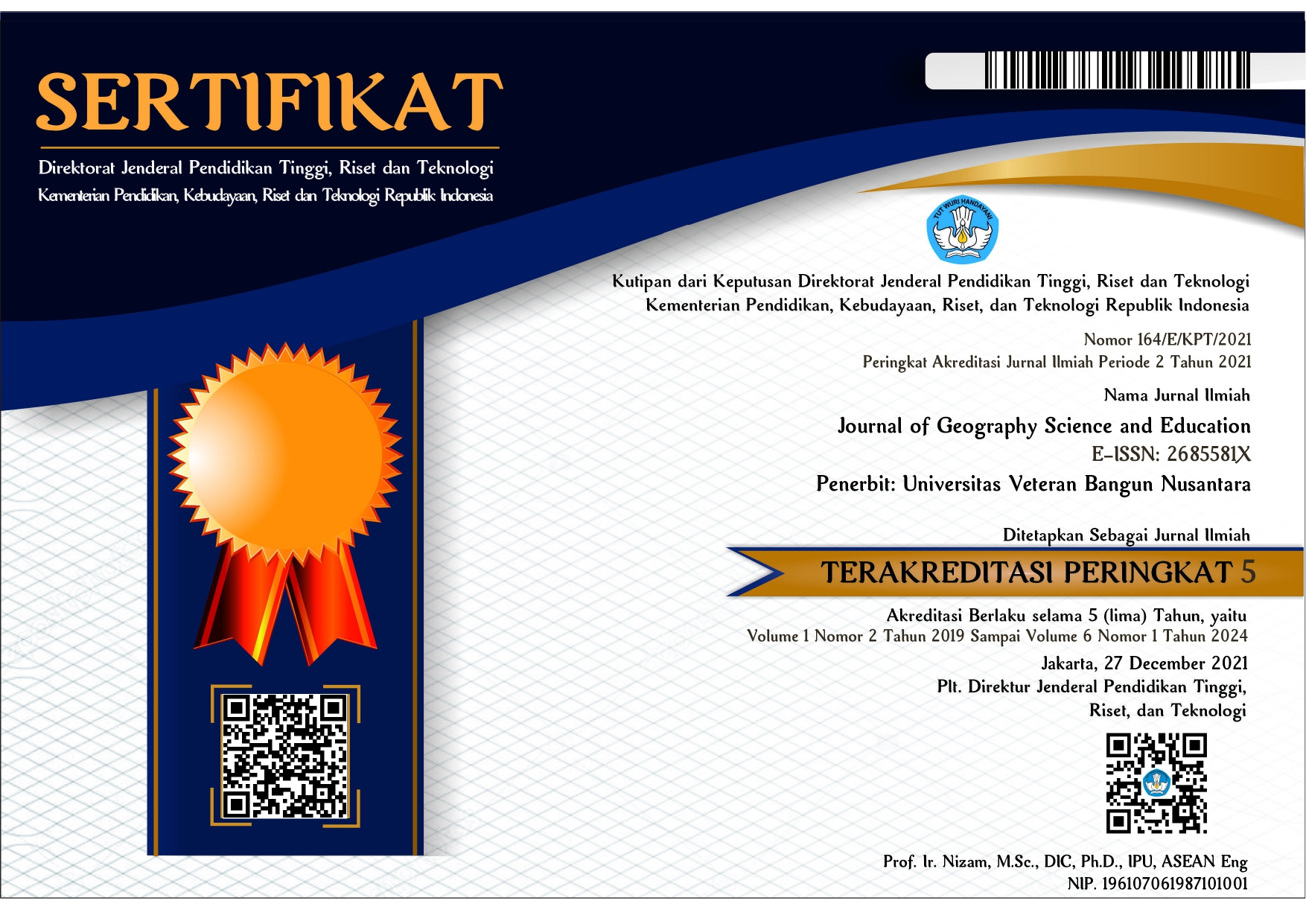MANAGEMENT OF ENVIRONMENTAL ETHICS APPROACH TO STUDENTS
DOI:
https://doi.org/10.32585/jgse.v1i2.463Abstrak
The purpose of this study was to determine the role of students in the level of awareness of environmental phenomena at the IKIP PGRI Pontianak Campus. the aim of building student awareness about the environment through Population and Environmental Education (PKLH) courses to support sustainable development. this research method is descriptive qualitative with the knowledge triangle learning approach based on interactive discussion analysis of knowledge, education and environmental innovation. the results of research by utilizing interactive discussion methods can encourage changes in students' attitudes to be orderly and respect environmental aspects by strengthening environmental ethics. The results of the learning analysis study were conducted using an out class teaching system. managing the results of the implementation of case studies and the reality of the results of theoretical studies that are implemented against the phenomenon of potential environmental problems. out class implementation building eduction of disaster mitigation management to environmental problems that focus on the phenomenon of inorganic waste. the role of the results of the study of strengthening environmental ethics in supporting student awareness with management efforts oriented towards economic, social and environmental approaches based on sustainable development.
Keywords: Ethics, Environment, Students.
Unduhan
Referensi
REFERENCE
Anonymous.2008. National Education System. "in https ://fadloly master teacher.wordpress.com. Accessed October 15, 2019.
Atok Miftachul Hudha, Husamah, Abdulkadir Rahardjanto. 2019. Environmental Ethics (Theory and Practice of Learning). Malang: Publisher of State University of Malang.
Dony Andrasmoro, Endah Evy Nurekawati. 2017. Analysis of the Development of Smallholder Forest Policy (HTR) Towards Improvement of Community Welfare in West Kalimantan and D.I Yogyakarta. Swarnabhumi Journal ISSN 2548-5563, Vol. 2 Number. 1, Journal of Geography and Geography Learning, Study Program of Geography at PGRI University in Palembang.
Mulyawati, Hanny et al., (2015). Social Studies Learning. Bandung: Alfabeta.
Provincial Government of Kalbar.2019. "An Overview of the Geographical Aspects of West Kalimantan" in http://www.kalbarprov.go.id (accessed 10 November 2019).
Ruslan, Rosady. (2004). Public Relations Ethics Conception & Application. North Jakarta: PT. RajaGrafindo Persada.
Subakti Arwin, 2015. "Population and Environmental Education". jakarta, Graha Ilmu.
Wibowo, W. 2014. "The Smart Way to Write Scientific Articles". Compass. Jakarta: http://www.puslitsosekhut.web.id.
Unduhan
Diterbitkan
Cara Mengutip
Terbitan
Bagian
Lisensi
License and Copyright Agreement
In submitting the manuscript to the journal, the authors certify that:
- They are authorized by their co-authors to enter into these arrangements.
- The work described has not been formally published before, except in the form of an abstract or as part of a published lecture, review, thesis, or overlay journal. Please also carefully read JGSE's Posting Your Article Policy at http://pubs2.ascee.org/index.php/ijele/about/editorialPolicies#custom-5
- That it is not under consideration for publication elsewhere,
- That its publication has been approved by all the author(s) and by the responsible authorities – tacitly or explicitly – of the institutes where the work has been carried out.
- They secure the right to reproduce any material that has already been published or copyrighted elsewhere.
- They agree to the following license and copyright agreement.
Copyright
Authors who publish with Journal of Geography Science and Education agree to the following terms:
- Authors retain copyright and grant the journal right of first publication with the work simultaneously licensed under a Creative Commons Attribution License (CC BY-SA 4.0) that allows others to share the work with an acknowledgment of the work's authorship and initial publication in this journal.
- Authors are able to enter into separate, additional contractual arrangements for the non-exclusive distribution of the journal's published version of the work (e.g., post it to an institutional repository or publish it in a book), with an acknowledgment of its initial publication in this journal.
- Authors are permitted and encouraged to post their work online (e.g., in institutional repositories or on their website) prior to and during the submission process, as it can lead to productive exchanges, as well as earlier and greater citation of published work.
Licensing for Data Publication
Journal of Geography Science and Education use a variety of waivers and licenses, that are specifically designed for and appropriate for the treatment of data:
- Open Data Commons Attribution License, http://www.opendatacommons.org/licenses/by/1.0/ (default)
- Creative Commons CC-Zero Waiver, http://creativecommons.org/publicdomain/zero/1.0/
- Open Data Commons Public Domain Dedication and Licence, http://www.opendatacommons.org/licenses/pddl/1-0/
Other data publishing licenses may be allowed as exceptions (subject to approval by the editor on a case-by-case basis) and should be justified with a written statement from the author, which will be published with the article.
Open Data and Software Publishing and Sharing
The journal strives to maximize the replicability of the research published in it. Authors are thus required to share all data, code or protocols underlying the research reported in their articles. Exceptions are permitted but have to be justified in a written public statement accompanying the article.
The associated persistent identifiers (e.g. DOI, or others) of the dataset(s) must be included in the data or software resources section of the article. Reference(s) to datasets and software should also be included in the reference list of the article with DOIs (where available). Where no domain-specific data repository exists, authors should deposit their datasets in a general repository such as ZENODO, Dryad, Dataverse, or others.
Small data may also be published as data files or packages supplementary to a research article, however, the authors should prefer in all cases a deposition in data repositories.










